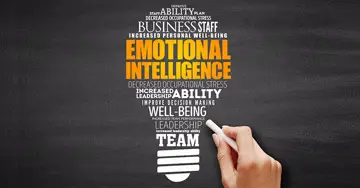How to hire for emotional intelligence
In today's dynamic work landscape, success goes beyond technical prowess or qualifications. Employers increasingly recognize the significance of emotional intelligence (EQ) as a key factor in an employee's potential success. But how can you effectively evaluate a candidate's proficiency in this seemingly soft skill? Continue reading Aniday's article to discover how to hire for emotional intelligence.

What is emotional intelligence?
Emotional intelligence comprises a range of abilities that empower us to recognize, comprehend, assess, and navigate emotions within ourselves and those around us. It can be broken down into four essential pillars for clarity:
-
Self-awareness: The skill of comprehending one's strengths, weaknesses, and emotions.
-
Self-management: The ability to regulate emotions, particularly in challenging and stressful situations.
-
Social awareness: The capacity to perceive and understand the emotions of others.
-
Relationship management: The skill of influencing, motivating others, and resolving conflicts by leveraging self and social awareness.
Individuals with a strong emotional intelligence quotient (EQ) can adeptly recognize, leverage, and channel emotions to attain optimal outcomes for both themselves and their peers. These skills not only elevate them as outstanding individual contributors but also position them as formidable team players and leaders.
Why is emotional intelligence important to an organization?
Now, more than ever, a company's success relies on innovation, adaptability, and effective collaboration. Emotionally intelligent employees, capable of shedding ego and embracing diverse perspectives, play a crucial role in achieving common goals.
Beyond internal dynamics, emotional intelligence is increasingly vital for managing external relationships with customers and clients, providing a significant competitive edge across departments.
The values of fostering emotional intelligence in workplace
This facet of intelligence holds immense value for the contemporary workplace and stakeholders across various functions:
-
Enables leaders to motivate and inspire exceptional work by understanding the motivations of others.
-
Encourages a diverse range of individuals to contribute, steering clear of the pitfalls of groupthink.
-
Empowers leaders to identify and seize opportunities that may elude others.
-
Aids in the recognition and resolution of conflicts in an equitable and impartial manner.
-
Has the potential to elevate morale and help individuals tap into their professional capabilities.

Tips for hiring emotional intelligence
Recognizing the significance of hiring emotionally intelligent employees, how can employers integrate this into their hiring process? Consider the following essential steps.
Make a dedicated commitment to emphasize emotional intelligence
Start by openly recognizing that emotional intelligence holds a prominent position as a hiring criterion. Integrate it as a crucial element in both recruitment and candidate screening processes
Once this commitment is in place, delve into the interview process to prompt candidates to elaborate on past experiences that demonstrate emotional intelligence, such as navigating a team through challenging situations.
Incorporate emotional intelligence into the interview
Infuse emotional intelligence into interviews through advanced behavioral techniques. Identify desired qualities, such as emotional intelligence, by probing candidates about their experiences, future goals, strengths, and weaknesses.
Encourage them to provide specific examples of successful teamwork, focusing on actions taken in challenging situations to assess their emotional intelligence. Use interview questions that simulate stress to observe how candidates respond to pressure, conflict, and emotionally charged situations.

Pose relevant questions
Assess EQ with behavioral-based questions or case studies, gaining insights into a candidate's motivations, thought patterns, and workplace behaviors. Here are a few questions tailored to assess a candidate's EQ level, focusing on their effectiveness in utilizing emotional intelligence in professional settings.
-
Describe a situation where you aimed for a team goal but fell short. Reflecting on it, what changes would you make?
This question assesses the candidate's team-oriented self-awareness. High emotional intelligence is indicated by a candidate promptly taking accountability, learning from failures, showcasing a growth mindset, and revealing their approach to managing stress or negative emotions.
Sample answer: In a past project, we aimed for a tight deadline but faced unforeseen challenges. Reflecting on this, I see the need for improved team communication. I would implement more frequent check-ins and advocate for a contingency plan to enhance overall preparedness. This aligns with my belief in continuous improvement for future success in team goals.
-
Share details about a colleague with whom collaboration is particularly challenging for you. How do you navigate and manage this working relationship?
This question explores the relationship management aspect of emotional intelligence. High-EQ candidates demonstrate self-awareness in their role, take responsibility for adapting their approach, and prioritize collaborative solutions.
Sample answer: I've faced challenges collaborating with a colleague. To address this, I initiated an open conversation to understand our differences, established clearer communication, and focused on finding common ground. Actively listening, showing empathy, and maintaining a collaborative mindset improved our working relationship, fostering a positive and inclusive atmosphere.
-
Describe a situation where you needed to be confrontational to achieve results. What actions did you take, and how was it received?
This question gauges emotional intelligence by exploring the context and specifics of a confrontation. Understanding its necessity and whether it was planned provides insights. A high-EQ candidate, even in unplanned confrontations, demonstrates self-management, emotional control, and the ability to work towards a positive resolution.
Sample answer: In a project, I addressed team misalignment by initiating a candid conversation. Using "I" statements, I expressed concerns constructively. Maintaining a calm demeanor, I actively listened and encouraged open dialogue. This collaborative approach resulted in improved communication and better outcomes.

For each question, hiring managers should delve into the candidate's thoughts, feelings, and actions through follow-up inquiries. If a candidate struggles to answer, it may indicate an aversion to tough conversations or difficulty admitting mistakes. The responses should be used to assess the candidate's self-awareness regarding their thoughts and emotions.
For those who can articulate specific scenarios, it's advised for hiring managers to evaluate whether their actions showcase the ability to take ownership, display personal accountability, and thrive in pressure situations.
Conclusion
When hiring top-notch employees, traits like past experience, aptitude, and cultural fit are crucial. However, prioritizing emotional intelligence (EQ) is paramount. In today's collaborative work environment, the ability to understand and manage emotions, as well as comprehend others, takes precedence. Aniday hopes this article has given you practical guidance on how to hire for emotional intelligence.
Aniday's HR Services
Headhunting Service
Find and recruit quality candidates in just 1 week! Supported by 40,000 experienced headhunters in IT, Finance, Marketing… capable of recruiting in any region.
Headhunting Service ➔Employer of Record (EOR) Service
On behalf of your business, we recruit employees and handle payroll without the need to establish a company in markets such as Vietnam, Singapore, Malaysia, India, Indonesia…
Employer of Record (EOR) Service ➔